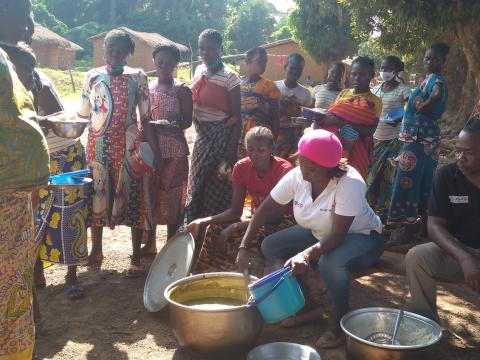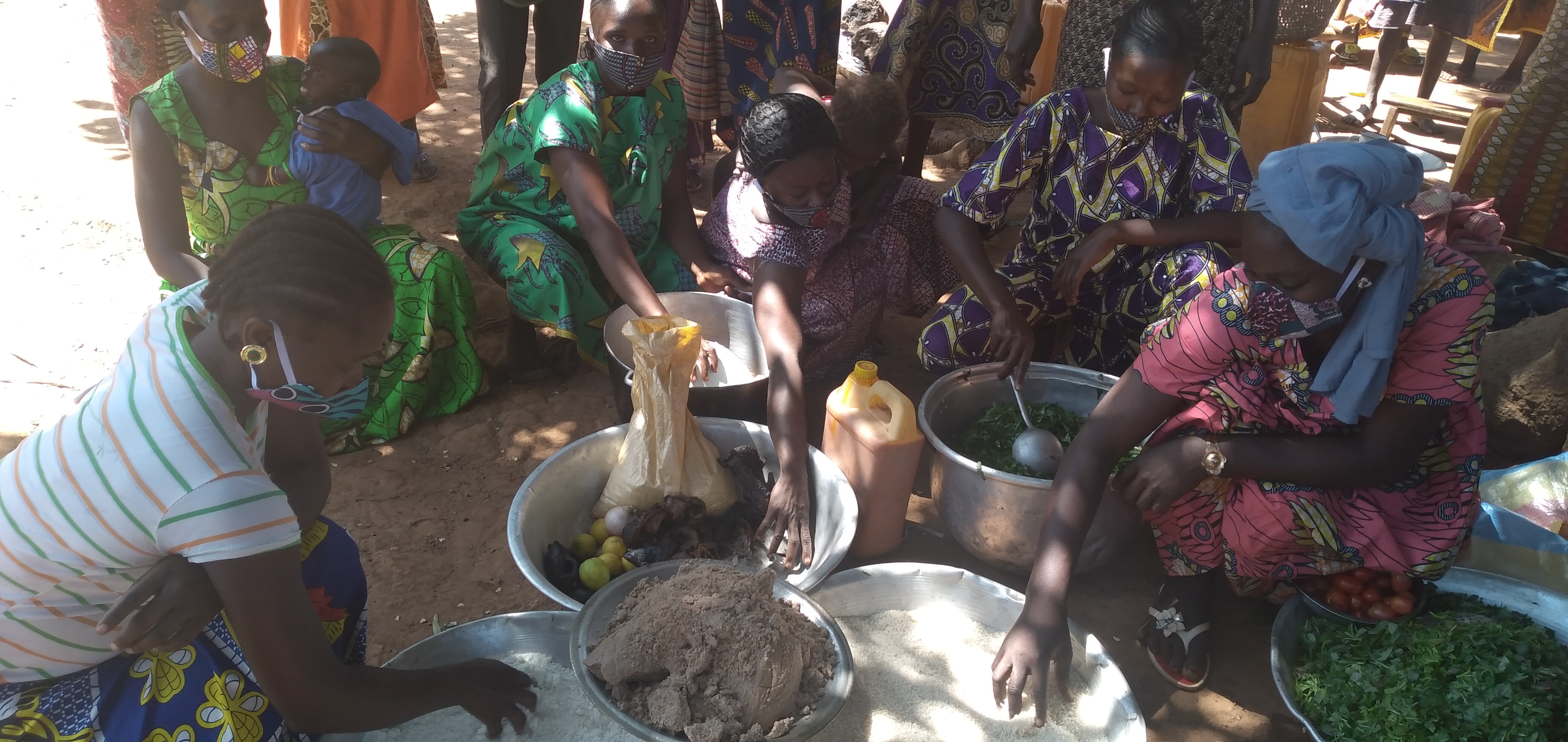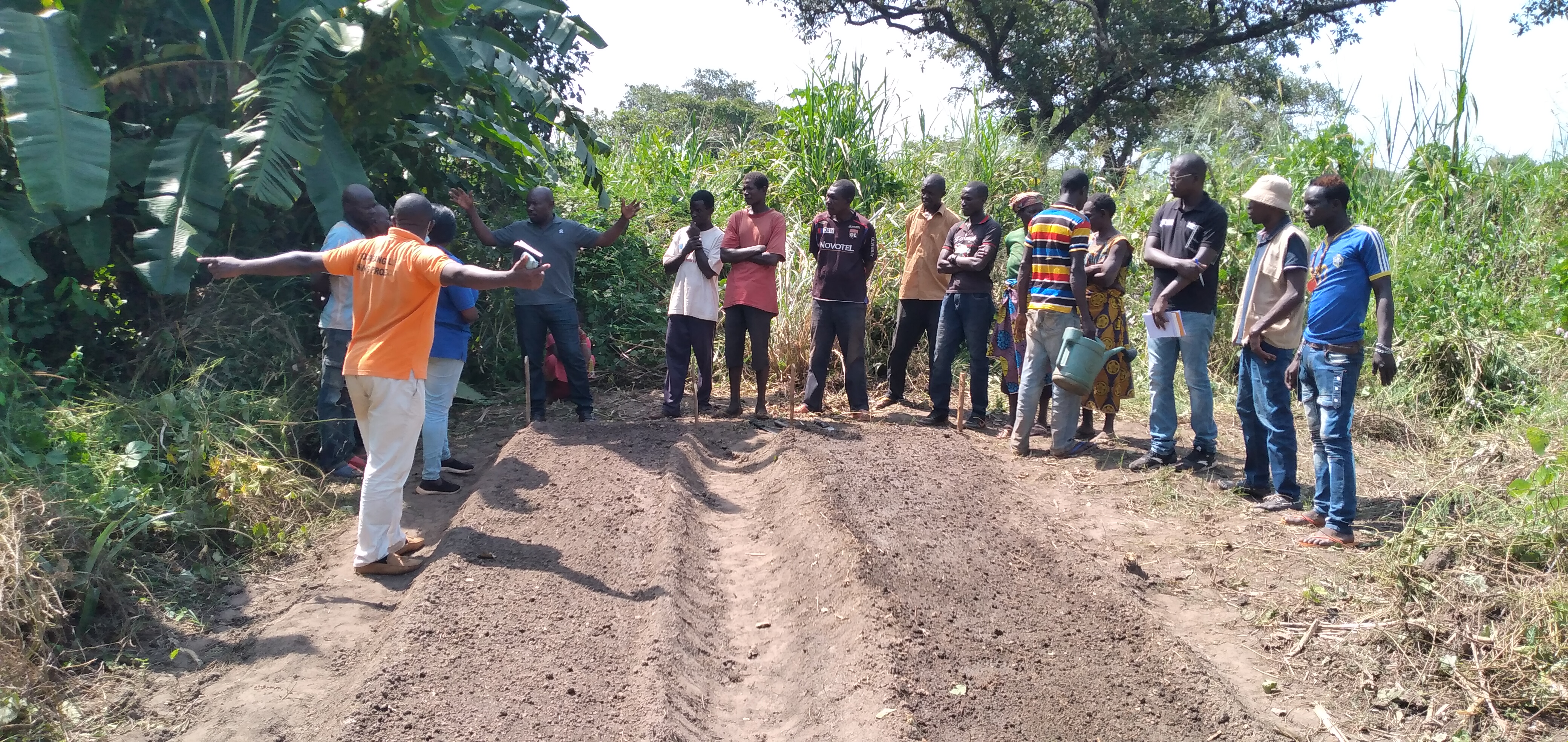Central African Republic: Vulnerable households reached with livelihood food items

By Bertrand Gaïlemas
Senior Communication and Public Engagement Officer - WVCAR
Since 2014, Bambari, in the Center part of Central African Republic (CAR), has been illustrating the complexities and challenges of the conflicts that have marked the country. During the conflict, Bambari, traditionally a dynamic economic centre and a hotbed of Central African populations, experienced several days of violence with the deaths and many injured who forced NGOs to suspend their humanitarian activities. In Bambari (41,486 inhabitants in 2012), everyone is almost internally displaced (more than 40,000).
The cumulative impacts of intercommunal clashes, recurrent population displacement, flooding and a prolonged period of exhaustion of agricultural assets have destroyed the livelihoods of people, obliging them to live in precarious situations.
Since November 13, 2010, World Vision Centrafrique has launched a Food Security and unconditional Cash Assistance Project, with funding from USAID, for 4,160 households of affected populations in the villages of Batobadja, Digui, Gbakomalekpa, Liwa, Madomale, Matchika, Ngaloua, Yakota and Yangouya.
Through this project, priority is givento households with children under 5 suffering from malnutrition, orphaned children and households of people with disabilities, pregnant and nursing women, elderly people, households unable to meet immediate food needs and households not receiving any other food aid.
Cash Distribution or money transfer
 All 4,160 targeted households will benefit from this cash transfer, which will allow them to access nutritious food of their choice and in sufficient quantity throughout the welding period. An amount of 35,000 XAF ($60.5) is unconditionally distributed to households over a six-month period. This support is welcomed by the beneficiaries, including Yvonne, a very ingenious third-age mother: Very grateful, Yvonne greeted the gesture of the Donor USAID with her own words: « May God give back to them a hundredfold, for they are like our Fathers and we are like their children ».
All 4,160 targeted households will benefit from this cash transfer, which will allow them to access nutritious food of their choice and in sufficient quantity throughout the welding period. An amount of 35,000 XAF ($60.5) is unconditionally distributed to households over a six-month period. This support is welcomed by the beneficiaries, including Yvonne, a very ingenious third-age mother: Very grateful, Yvonne greeted the gesture of the Donor USAID with her own words: « May God give back to them a hundredfold, for they are like our Fathers and we are like their children ».
Several measures are taken to ensure the safety of both staff and beneficiaries. The hours and distribution site are chosen to allow time for the beneficiaries to return safely home. At the end of the distribution, a certificate of receipt is signed in two copies between World Vision and the local committee members and edited by the Chief of the village.
Cooking demonstration or Mother’s Clubs
This component is based on nutrition activities to promote maternal and child health and nutrition. Twenty-two mother clubs are established in the target locations of this intervention to promote exclusive breastfeeding for the first six months and an appropriate transition to complementary foods at six months. These Community Mother Leaders organize bi-monthly meetings to encourage their sisters to attend prenatal and postnatal visits. There is also an opportunity to attend cooking demonstrations to promote nutritious foods and develop healthy cooking standards in their households.
World Vision Team Nutrition members explain the benefits of food for mother and child. It is also an opportunity to promote nutritious foods that can be purchased with cash transfers and show how to prepare vegetable products, good hygiene and other related topics. The World Food Programme’s (WFP) basic food ration includes cereals, legumes, vegetable oil and iodized salt.
Market gardening
 World Vision intends to help 550 of these beneficiary households to engage in market gardening activities. The vegetable garden is little developed in the sub-prefecture of Bambari because many people do not have the knowledge, skills and initial input required and have never experienced the added value of this practice within the framework of their livelihoods. The vegetable garden will provide beneficiaries with sufficient healthy household food and create a surplus for sale. The participation of local authorities like Emil Gentil, Chief of the village Kpetene located at 26 km from Bambari, during the choice of sites, is much appreciated: “Knowing the importance of growing the land, I am proud to bequeath a portion of my land to my people. I appreciate this initiative to empower the population for its livelihoods ». The selected vegetable crops are fast-maturing nutritious vegetables (short cycle), which will promote the diversification of the diet with nutritious foods. Seeds include okra, amaranth, tomato, cabbage, onion, spinach and carrot.
World Vision intends to help 550 of these beneficiary households to engage in market gardening activities. The vegetable garden is little developed in the sub-prefecture of Bambari because many people do not have the knowledge, skills and initial input required and have never experienced the added value of this practice within the framework of their livelihoods. The vegetable garden will provide beneficiaries with sufficient healthy household food and create a surplus for sale. The participation of local authorities like Emil Gentil, Chief of the village Kpetene located at 26 km from Bambari, during the choice of sites, is much appreciated: “Knowing the importance of growing the land, I am proud to bequeath a portion of my land to my people. I appreciate this initiative to empower the population for its livelihoods ». The selected vegetable crops are fast-maturing nutritious vegetables (short cycle), which will promote the diversification of the diet with nutritious foods. Seeds include okra, amaranth, tomato, cabbage, onion, spinach and carrot.
World Vision works closely with the technical support structures of farmers. World Vision encourages beneficiaries to transfer their knowledge to each other. Nicolas was trained in a similar project previously: “In this project, I will focus on coaching my peers in the village. We have the will. But we need coaching” he says.
As the health pandemic with COVID-19 is current, this aspect is taken into account in all activities, especially in the WASH where intensive communication actions are planned.